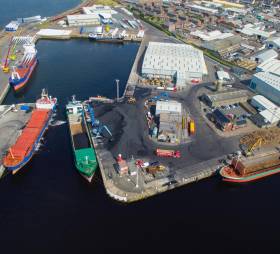Displaying items by tag: Ayr, Firth of Clyde
#BusiestDay - On the Firth of Clyde, Scotland is ABP’s Port of Ayr which has recorded one of its busiest days in the last 25 years, with five vessels calling at the port last week.
Overall, it was one of the busiest weeks in Ayr in a generation, with 10 vessels calling at the port last Thursday- four of those for renewable energy projects. The last time the port saw this level of activity was when 1.1 million tonnes of open cast coal was exported through Ayr in 1991.
The UK energy industry currently is transitioning to renewable energy sources, and the boost in ship numbers reflects the growing demand to serve wind farm projects underway in the south-west of Scotland.
Thursday’s record day saw the port become a hub of activity with five ships calling in Ayr, each accommodating different cargoes such as onshore wind turbine components, coal exports and timber discharge.
Below are the following vessels involved in wind turbine components delivered for three separate renewable energy projects:
• The MV Abis Bergen and MV Fehn Pollux delivered wind turbine blades for the Brockloch Rig wind farms;
• The MV Arctic Rock arrived with wind turbine blades for the Dersalloch wind farm; and
• The MV Dragonera delivered tower sections and the nacelle for the Minnygap wind farm.
Port Manager for Ayr and Troon Stuart Cresswell said: “Along with our traditional agribulk and mineral business, the wind turbine contracts we have secured this year have provided a fantastic boost to the port and all our local supporting contractors and suppliers.”
ABP Short Sea Ports Director Andrew Harston said: “Following our success in supporting additional cruise calls this year, we are now actively supporting the development of more renewable power in south-west Scotland.”
“The location of ABP’s Ayrshire ports places them in close proximity to these onshore wind farms. The Ports of Ayr and Troon (see: closure confirmed of Larne, Northern Ireland ferry service) are equipped and ready to work with renewable energy companies to serve their projects.”
“This has been a strong period for our two Scottish ports. ABP is continually investing in the ports to underpin the important regional role they fulfil in serving the needs of the Ayrshire region and the west coast of Scotland.”
Across the Associated British Ports Group, ABP has over 30 years’ experience serving the UK onshore and offshore renewable energy industry.
The ports group have been involved in a range of renewable energy projects across Britain including: the Walney Extension wind farm development off Barrow-in-Furness (see recent largest cruiseship call) Galloper wind farm project serviced from ABP Port of Lowestoft and the Green Port Hull development with Siemens in the Humber.
























































